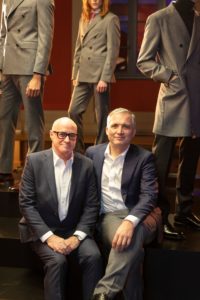The Lost Jewish Brands of Berlin. Once upon a time the German capital had a thriving fashion industry run by Jews. The Nazis destroyed it. Now one company is trying to bring it back.

By: Vanessa Friedman Published December 5th, 2019
Last month, Andreas Valentin, a 66-year-old professor at the State University of Rio de Janeiro, traveled more than 6,000 miles from Brazil to Berlin to participate in a restitution ceremony, of sorts.
He was the guest of honor at the unveiling of a … well, not new, exactly, but renewed fashion brand: Manheimer, founded by his great-great-grandfather, Valentin Manheimer, in 1840. It was once known as “the king of coats” and famous for creating mass-produced high-end ready-to-wear (or Konfektion) for men and women. Reimagined as a men’s wear brand focused on a kind of plush, minimal suiting, the clothes are now for sale once again.
If you haven’t heard of it, that’s understandable. Manheimer has been defunct since 1929. But once upon a time, around the turn of the 20th century, it was at the center of a German fashion world that rivaled Paris and London in design, production and glamour.
It was, however, a world largely run by Jews. As a result, it largely disappeared during the 1930s, as the Nazi regime destroyed or deracinated Jewish businesses. “In 1933, there were about 2,700 first-class fashion producers in Berlin,” said Uwe Westphal, a former journalist and the author of “Fashion Metropolis Berlin.” “By 1939, there were less than 150.” Other estimates are even lower.

Now one firm hopes to bring back a host of lost brands. Manheimer is among 32 companies founded by Jews, including the watchmaker F. L. Löbner, the luggage maker M. Würzt & Söhne and the cobbler Breitsprecher, that once speckled the streets of Berlin around the area known as the Hausvogteiplatz. Their trademarks have been acquired by Jandorf Holding, with the stated aim of restoring Germany to its rightful place in the realm of personal luxury — and in the process reconnecting the brands to the heirs and bringing them back to their birthrights.
“Germany is known for luxury car brands,” said Lothar Eckstein, one of the Jandorf partners. “Everyone knows Gottlieb Daimler. But no one knows Manheimer was responsible for what became a global industry.”
They have that thing so beloved of the modern branding operation: a story to tell. The question is, can they make anyone hear it?
It is not an easy appeal. No matter how nice the clothes are.
Wiping Out the Past
Mr. Eckstein discovered the story when he moved to Berlin, after having grown up in a small town near Stuttgart. He was running Amazon in Germany and had founded his own independent media company. He realized, he said, “that the luxury industry moving online meant brands are more important, and that means brand history is more important.”
